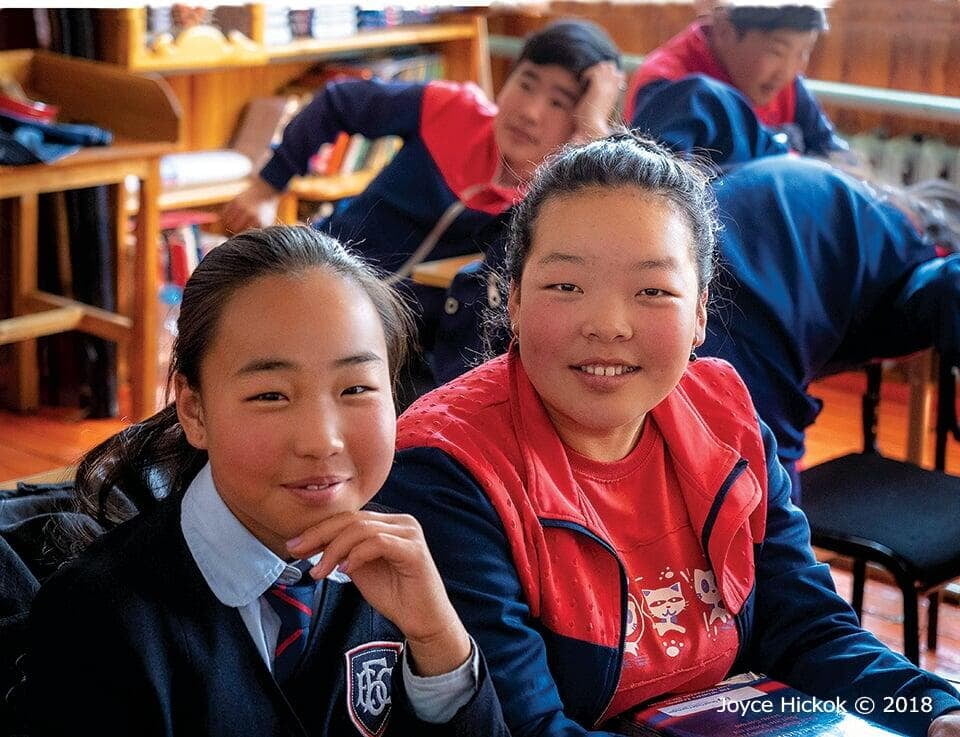Mongolia
Mongolia Mongol Uls Northern Asia AREA 618K mi2; 1.6M km2 [20th largest of 257 countries] ARABLE 0.4% POP 3.3M(5/mi2; 2/km2) [133rd highest of 237 countries] GOV’T Semi-presidential republic CAPITAL Ulaanbaatar (1.7M) GDP/CAPITA $11,700 UNEMPLOYMENT 7% IN POVERTY 28% LIFE EXP 72 years MEDIAN AGE 31 yrs INFANT MORT 20/1K live births (78th) LITERACY 99% LANGUAGES Mongolian (official) (Khalkha dialect predominant), Turkic, Russian RELIGIONS Buddhist 52%, Muslim 3%, Shamanist 3%, Christian 1%, other <1%, none 41% HEALTH 5% of GDP EDUCATION 5% of GDP (88th) MILITARY 0.6% of GDP (153rd) LABOR FORCE Agriculture 12%, industry 38%, services 5% PCVs 1991–present CURRENT: 36; TTD: 1,491 |  Mongolia Engaging smiles show how much these students are enjoying the rare opportunity to practice their English skills with a visitor to their classroom in Khövsgöl Province, a vast and mountainous expanse in northern Mongolia. Like many Mongolian children, they live at a boarding school during the academic year. Almost half Mongolia’s population consists of nomadic herders on the country’s seemingly endless grasslands, making it difficult for families to educate their children—other than by sending them to boarding schools.
Joyce Hickok ©2018 PCV The Gambia 1971 | St. Vincent & the Grenadines 1980-1982 Education |
Adult Books

By George B. Schaller
Publisher: Yale University Press (February 18, 2020)
Language: English
Hardcover: 224 pages
ISBN-10: 0618043713
ISBN-13: 978-0618043712
Summary:
Mongolia became a satellite of the Soviet Union in the mid-1920s, and for nearly seven decades it effectively closed its doors to the outside world. Biologist George Schaller, who first visited the country in 1989, was one of the first Western scientists allowed to study and assess the conservation status of Mongolia’s many unique, native wildlife species. Schaller made a number of trips from 1989 to 2018 in collaboration with Mongolian and American scientists, witnessing Mongolia’s recovery and transition to a market economy after the collapse of the Soviet Union.
This informative and fascinating new book provides a firsthand account of Schaller’s time in this little-known and remote country, where he studied and helped develop conservation initiatives for the snow leopard, Gobi bear, wild camel, and Mongolian gazelle, among other species. Featuring magnificent photographs from his travels, the book offers a critical, at times inspiring contribution for those who treasure wildlife, as well as a fresh perspective on the natural beauty of the region, which encompasses steppes, mountains, and the Gobi Desert.
Reviews:
“Schaller is driven by his vision of what must be done if wild spaces and rare species are to persist. . . . He is eloquent in his condemnation of what he deems gross mismanagement by the nation’s current political leaders, who allow oil drilling, mining and road-building in crucial protected areas.” —Tom McCarthy, Nature
“With great dedication to wildlife in all of its manifestations, George Schaller explores the vast steppes and other habitats of Mongolia. His revelatory explorations will undoubtedly aid the conservation of this unique ecosystem.” —Frans de Waal, author of Mama’s Last Hug: Animal Emotions and What They Tell Us about Ourselves
“Luminously written, Into Wild Mongolia introduces us to remote, often cold, and desolate landscapes, animals such as the Bactrian camel, and local characters, richly rendered. We learn to read the wordless movements of elusive creatures like the snow leopard, communicated in the oldest writing on earth, their footprints in soil and snow. George Schaller is an icon; for his dedication to conservation and his love of biodiversity we can only be grateful.” —James Prosek, author of Trout of the World and Eels.
“George Schaller, a true giant, is essentially the original field biologist. His words are living history. This astonishing, vivid book describes a region that has changed, but must never be forgotten.” —Carl Safina, author of Beyond Words: What Animals Think and Feel
About the Author:
George B. Schaller is a field biologist who is considered one of the founders of contemporary wildlife conservation, known for his research on tigers, mountain gorillas, and giant pandas. He is a senior conservationist with the Wildlife Conservation Society, and the author of more than a dozen books, including the National Book Award winner The Serengeti Lion.
Kids' Books

By Bao’erji, Yuanye; illustrated by Guituzi.
Publisher: New Rochelle, NY: Reycraft Books, 2021.
Format: unpaged; col.illus.
ISBN: 978-1-47887-507-9
Age Range: 5-8 yrs.
Summary:
The morin khuur is a musical instrument with mythical origins and symbol of the Mongolian people. This tale recounts how a magical white horse and a blossoming apricot tree on the grasslands of Mongolia led to its creation.
Films
Film: The Steed
Director: Erdenebileg Ganbold
Release Date: 2019
Music
GangBay: GangBay YouTube Channel
Recipes
Mongolia Cultural Resources




